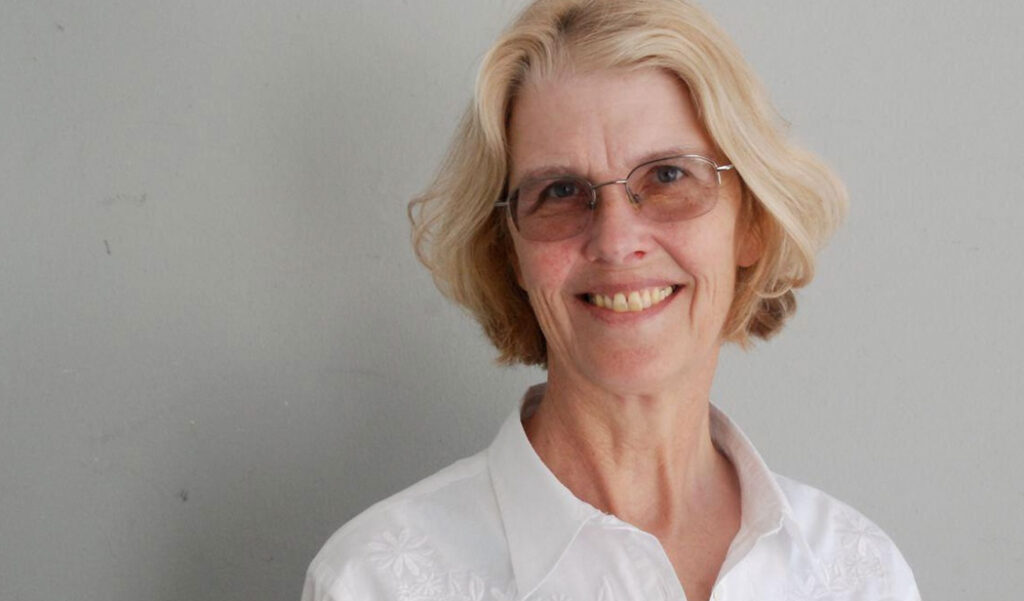
George Harrison was Jane Smiley’s favorite Beatle. He came up during my lunch with the Pulitzer Prize winner because she namechecks the Traveling Wilburys—a supergroup that included Harrison—in Lucky, her most recent novel. (Last month’s column includes the first part of our conversation.) Both she and I love the Wilburys, and our shared enthusiasm for Harrison was not at all diluted by Paul McCartney’s “Let ’Em In,” which was playing over the speakers at St. Burch in downtown Iowa City as Smiley reflected.
As McCartney urged us to “open the door and let ’em in,” Smiley said of the Wilburys, “I think one interesting thing about the Wilburys is that you can tell by the theme of the song who composed them. And the ones about being a good person—you know, learning—those are by George. Some of the not very nice ones are by Bobby.”
She was referring to Bob Dylan, also a member of the Wilburys, whose 2016 Nobel Prize in Literature struck Smiley as an affront—not because a songwriter is not the typical recipient of the Nobel, but because she thought a different songwriter was more deserving. “I said, ‘Wait a minute. What about Leonard Cohen? What’s wrong with you?’ Because I am a big fan of Leonard Cohen.”
Smiley turned back to the Beatles to explain something that was important to her in her portrayal of Jodie Rattler, the folk musician who narrates Lucky.
“I don’t think the Beatles realized, even when they were famous, that they were going to be famous forever. That’s one of the things I was thinking about when I was deciding what Jodie was going to do in her career. One of my favorite songs is by the Mavericks. It’s called ‘Pardon Me,’ and it’s about how hard the musical life is. And I didn’t want Jodie to have to deal with that. She’s all by herself. She doesn’t have any backup. That’s a good thing in some ways, but it’s a bad thing in other ways. So I wanted to give her a way where she could pursue her music career and have it be a pleasure and not a strain.”
The successful building of a musical career that is truly a pleasure might be thought of as one example of Jodie’s luck in the novel. But Lucky opens with Jodie describing her first experience of luck—as a child at a horse race where her uncle lets her pick the horses.
“For Jodie, her first sense of luck is when her uncle wins the money, because he’s the one that tells her that they’ve been lucky. She was the one who circled the numbers, but she had no idea what she was doing. And I think that’s what luck is. As you go along in your life and you’re trying to make it through, there’s a lot of stuff that you have no idea how to do it or what to do, and then you try something, and it works. You cannot say that you knew what you were doing. So the thing that works is a piece of luck, but also it teaches you something about what to do. She understands as she makes her way that she’s pretty solitary. . . . She’s pretty isolated. So it’s sort of her job to do the best she can. . . . I imagine her as being very reserved, but also being observant.”
Smiley also thinks of Jodie’s looks as a kind of luck. “She can do any kind of love thing her own way, because she’s attractive enough so that if she shows interest in a guy, he may show interest in her. But she’s not so attractive that guys are always pestering her.”
Jodie is even able to set the terms of her relationship with the novel’s Prince Charming-adjacent character—a man named Martin—in a way that is satisfying to her without giving up her freedom.
“So I think Jodie never regrets not sticking with Martin . . . because there would be certain requirements for her as the wife of an aristocrat,” Smiley said. “More than anything, she wants to explore.”
I encourage you to explore Jane Smiley’s impressive and varied output—including Lucky. And should she ever invite you to lunch, I encourage you to take her up on that. I feel very lucky, indeed, to have shared a meal and an engaging conversation with her.
